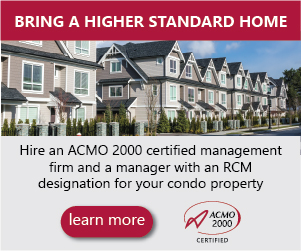Condominium Manager Magazine
CM Magazine is the flagship quarterly publication of the Association of Condominium Managers of Ontario (ACMO) and for more than 30 years has served as the leading source of in-depth coverage of industry news, issues, information, education and best practices for condominium management professionals and service providers.
CM Magazine has a printed circulation of 7,000+ per issue and a digital circulation of approximately 400 views per issue. The audience consists of Condominium Managers, Condominium Management Companies, Industry Services & Trades Providers, and Condominium Boards.
Article submission is not open to the general public. ACMO members in good standing may contribute articles. From time to time we will reach out to the broader condominium industry and request articles from non-members and other industry experts (e.g. government partners, educational partners, legal experts), if the subject matter requires a distinctive perspective that cannot be addressed by an individual ACMO member or company.
To learn more about writing for CM Magazine, see our Editorial Guidelines.
To advertise in CM Magazine, check out the Advertising Opportunites page or email ads@acmo.org for more information.






